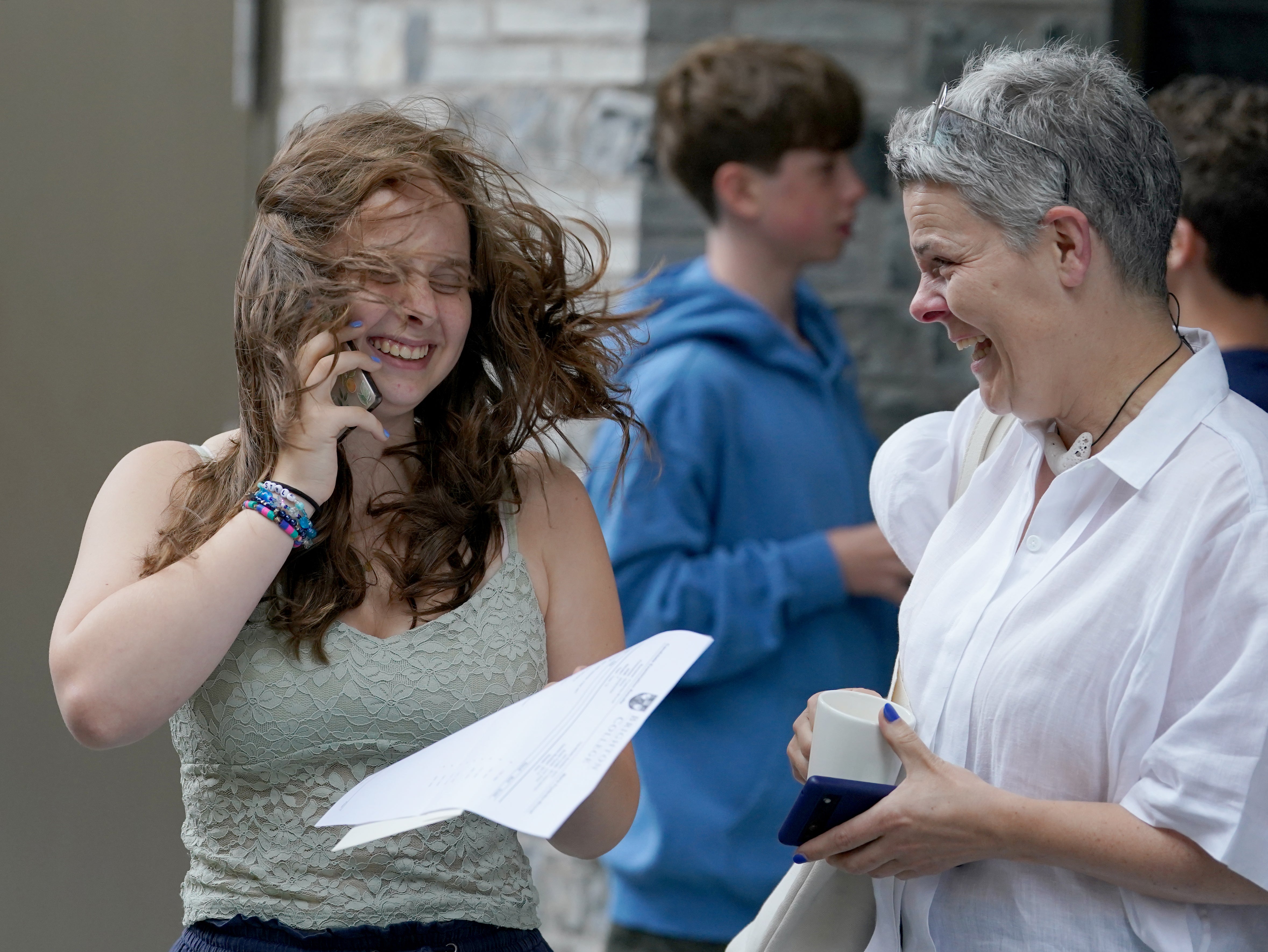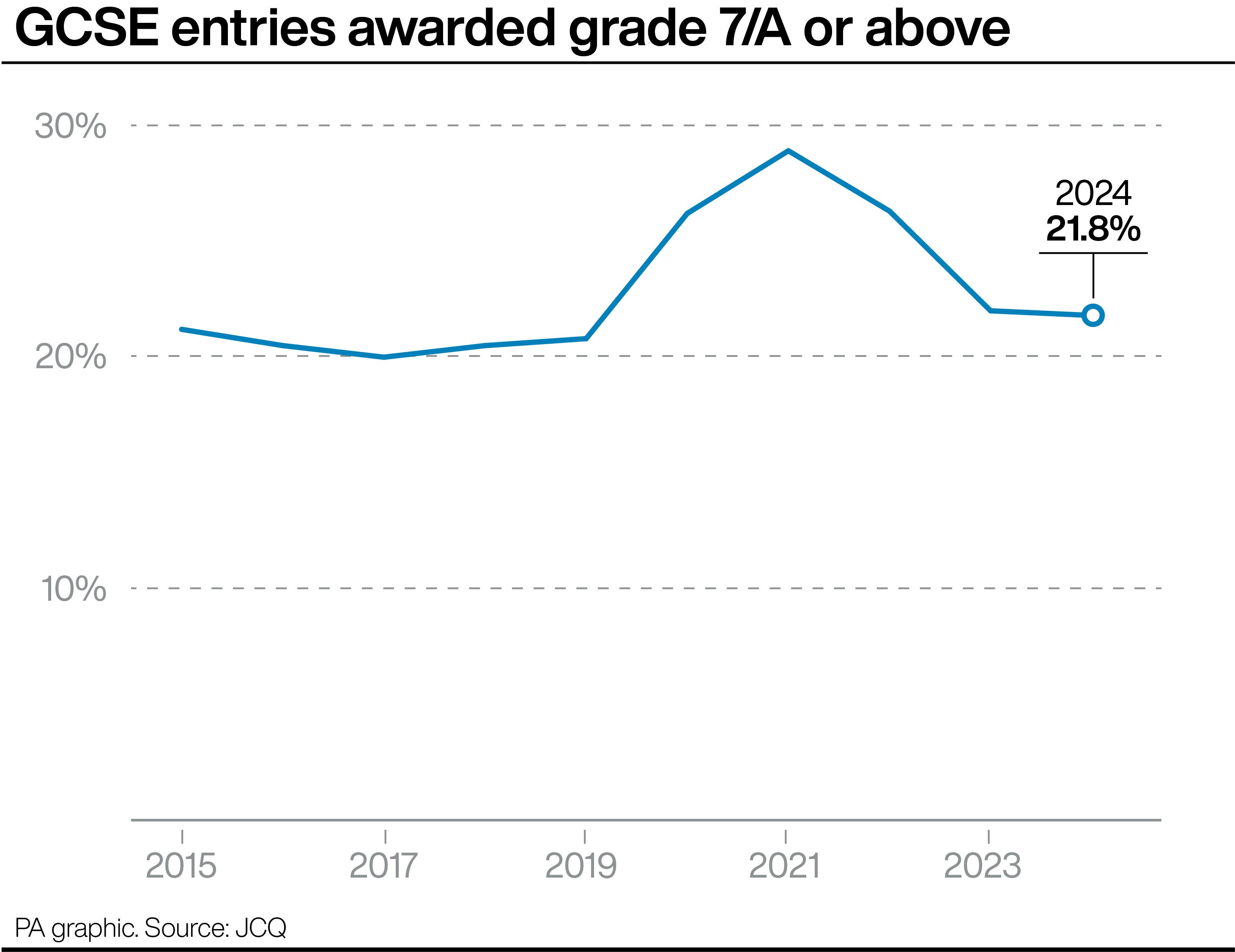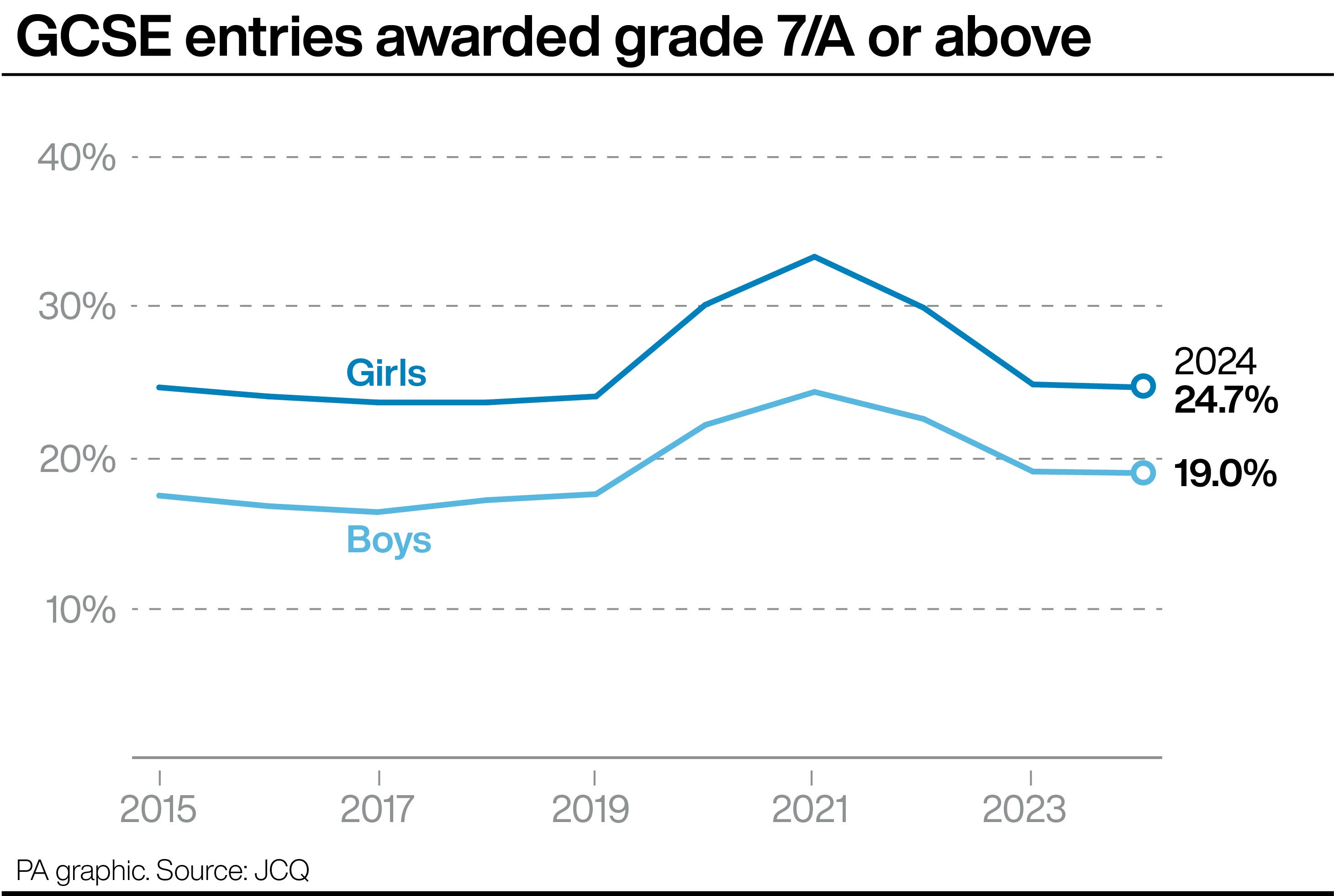GCSE top grades down on last year as north-south divide in England grows
Hundreds of thousands of teenagers in England, Wales and Northern Ireland picked up their results on Thursday morning in a year when grades were due to be restored to 2019 levels in all three nations

The proportion of GCSE entries awarded top grades has fallen from last year, amid a growing north-south divide in England.
Hundreds of thousands of teenagers in England, Wales and Northern Ireland picked up their results on Thursday morning in a year when grades were due to be restored to 2019 levels in all three nations.
Many of the pupils who are receiving their grades were in Year 7 when schools closed due to the pandemic and schooling became disrupted.
More than a fifth (21.8 per cent) of UK GCSE entries were awarded the top grades (at least a 7 or an A grade) this year, down 0.2 percentage points on last year when 22 per cent of entries achieved the top grades.
This is higher than the equivalent figure for 2019 (before the pandemic caused the closure of schools) of 20.8 per cent.


The proportion of entries getting at least a 4 or a C grade (considered a “standard pass”) has fallen from 68.2 per cent in 2023 to 67.6 per cent this year – a drop of 0.6 percentage points, but higher than the 67.3 per cent in 2019.
The overall rate for grades 1/G or above is 97.9 per cent, down from 98.0 per cent in 2023 and 98.3 per cent in 2019. This is the lowest 1/G figure for nearly two decades, since 97.8 per cent in 2005.
Concerned education leaders said Thursday’s results showed that some English regions, such as the North East, were still being disproportionately affected by the cost of living crisis and the pandemic.
The latest figures show London and North East England continue to have the highest and lowest proportion of GCSE entries awarded grade 7/A or above in England.
But the gap between the regions has narrowed for the first time in nearly a decade.
In London, 28.5 per cent of entries were awarded 7/A or higher this year, up slightly from 28.4 per cent in 2023, while for North East England the figure was 17.8 per cent, up from 17.6 per cent.
The gap between these two regions this year stood at 10.7 percentage points, down from 10.8 points in 2023. It is the first time this gap has narrowed year on year since 2016, when it fell from 7.7 points to 7.5 points.
Since 2016, it grew every year, peaking at 10.8 points in 2023.
But while there has been a slight narrowing of the gap between the highest- and lowest-performing regions, there are still concerns that there is a significant gulf in attainment.
Chris Zarraga, director of Schools North East, which represents 1,150 schools in the region, said students had achieved outstanding results despite facing “enormous disruption” to their schooling in recent years, particularly in the North East.
He said: “Despite these record GCSEs, exam results in 2024 continue to map the disproportionate impact of the pandemic and cost of living crises, as well as the long-term perennial educational challenges that regions like the North East face.
“These results were a test of how successful the previous government’s plans were at supporting education recovery post pandemic, especially in disadvantaged areas like the North East.
“It is clear that current education policy is failing to close the disadvantage gap in attainment.”
Sir Peter Lampl, founder of the Sutton Trust charity and founder of the Education Endowment Foundation, said: “The stubborn regional disparities in attainment are unchanged.”

He added: “To close these gaps and enable pupils to reach their potential, we need sustained investment in teaching, particularly in areas with lower attainment.”
Paul Whiteman, general secretary at school leaders’ union NAHT, said inequalities between regions “have been exacerbated over the last decade by funding cuts to schools and community services, the pandemic, and the cost of living crisis.”
He added: “Schools do their best to support pupils and close those gaps, but they cannot do this alone. Unfortunately, the previous government failed to provide anything like the resources needed to address these inequalities.
“We welcome the new education secretary’s pledge to address regional disparities.”

It comes after Covid-19 led to an increase in top GCSE and A-level grades in 2020 and 2021, with results based on teacher assessments instead of exams.
But last week, the proportion of A-level entries awarded top grades rose on last year and surpassed pre-pandemic highs.
While traditional A*-G grades are used in Northern Ireland and Wales, in England these have been replaced with a 9-1 system, where 9 is the highest.
A 4 is broadly equivalent to a C grade, and a 7 is broadly equivalent to an A.
The latest Ofqual figures show the attainment gap in GCSE results between private and state schools in England has widened at the top grades this year.

This summer, nearly half (48.4 per cent) of private school entries scored a grade 7 and above compared to 19.4 per cent of those at comprehensive schools: a gap of 29 percentage points. Last year this gap was 28.2 percentage points.
But the gap between private and comprehensive schools has narrowed compared to 2019, when it was 29.3 percentage points.
Education secretary Bridget Phillipson said: “These pupils have shown remarkable resilience and determination, defying unprecedented disruption throughout the pandemic, Raac [the schools concrete crisis] and strike action.”
She added that the government was “committed” to breaking down barriers to opportunity by addressing “entrenched” regional disparities.
Nearly 373,000 vocational and technical qualification (VTQ) results have also been awarded to pupils.
Jill Duffy, chair of the JCQ board of directors and chief executive of the OCR exam board, said: “We’re seeing a record number of results issued today, and every one of them represents a student’s hard work, as well as that of their teachers, parents, and support staff.”
In Scotland, results for National 5 qualifications earlier this month showed the pass rate was 77.2 per cent, down from 78.8 per cent last year and 78.2 per cent in 2019.
Join our commenting forum
Join thought-provoking conversations, follow other Independent readers and see their replies
Comments
Bookmark popover
Removed from bookmarks